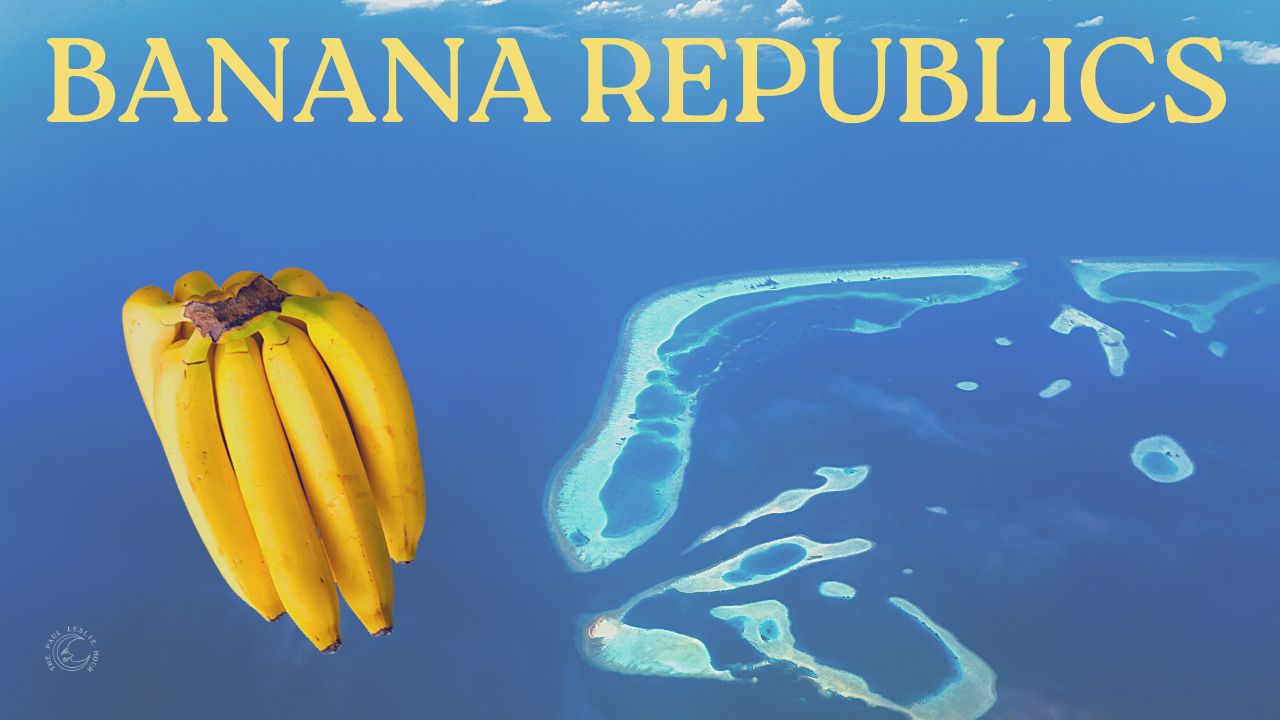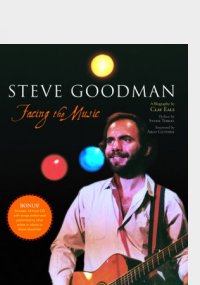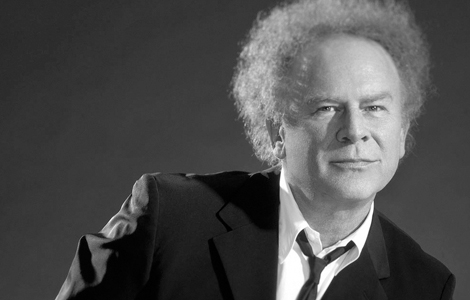“Banana Republics” is a song written and recorded by Steve Goodman and later recorded by Jimmy Buffett. This is an in-depth essay about the song and a comparison of the two versions. We include excerpts from an interview with Steve Goodman and a never before heard interview Goodman biographer Clay Eals did with Jimmy Buffett. Then, Paul talks with Clay Eals about the song.
This article would have not be possible without Clay Eals incredible generosity of spirit and his passion for all things Steve Goodman. Eals is the author of Steve Goodman: Facing the Music.
Have you ever heard a song that made you envision every single detail in your mind? I can recall hearing the song “Banana Republics” for the very first time. Like many people, I first heard the version by Jimmy Buffett. Although it’s obviously about the Caribbean or perhaps Central America, it doesn’t tell the typical story about a perceived paradise.
Just look at the line: “Down in the Banana Republics, things aren’t as warm as they seem.”
There’s a lot more truth to the song compared to other songs about ostensibly carefree tropical, exotic locales. There’s and an aura of mystery in this story and just a touch of darkness.
“Banana Republics” was written by Steve Goodman
Finding out the song was written by Steve Goodman, one of the great American songwriters lead me to seek out the original version by Steve Goodman from his album “Words We Can Dance to.” “Banana Republics” is one of many great songs Goodman wrote, including “City of New Orleans” by Arlo Guthrie and “You Never Even Called Me by My Name,” made famous by David Allan Coe.
What are the origins of the song? Goodman introduced his performance of “Banana Republics” on May 21, 1984 at Parody Hall in Kansas City, Missouri. This would be just four months before Goodman’s passing:
“Well, I made up this song a few years back about Central America, and I hate like hell to see it come true. This was originally just for the square-grouper fishermen down there, what Jim Buffett called the runners down there.”
We will get more into the songs inspiration shortly.
I heard the Goodman version again playing inside Hemingway’s Tropical Bar and Grill in Marietta, Georgia. I should mention, this was around 20 years ago and it’s stayed with me. I remember thinking the song seemed to suit the storied bar with its wood floors and salty ambience. Listening closer, the musical arrangements married to Goodman’s earnest vocals. It really struck me because everything caught the mood so perfectly. I felt like I had seen every image in the song.
Jimmy Buffett covered “Banana Republics”
Which version is better—Goodman’s or the more commercially successful interpretation Buffett did on his 1977 “Changes in Latitudes, Changes in Attitudes” album. Each seemed to be perfect recordings. In Buffett’s hands, it felt like it was his own song. Just like “Lovely Cruise” from that same record, I’ve encountered many people who swear that Buffett wrote it.
I’m reminded of the song “(Would You Lay With Me) In a Field of Stone.” It has two definitive versions—the Tanya Tucker interpretation and the one that came a couple of years later recorded by the song’s writer: David Allan Coe. Pick a better version. You can’t.
Interesting side note: Coe’s recording of “(Would You Lay With Me) In a Field of Stone,” is the B-side of the aforementioned “You Never Even Called Me by My Name” that Goodman wrote with John Prine.
The inspiration behind “Banana Republics”?
So, what inspired the song “Banana Republics.” Here is an excerpt from the Los Angeles-based “Folkscene” radio show, dated May 20, 1976,. This is one of the most complete descriptions of “Banana Republics” and it’s inspiration. The show was hosted by Howard Larman, who passed away in 2007.
Howard Larman:
Where does, y’know, where does an idea come from like, y’know, “Banana Republics”? What’s the story?
Steve Goodman:
Oh, I had a busman’s holiday in St. Croix. I played a bar down there in the King Christian Hotel in Christiansted. The bar was called the Foggy Bottom, and it was. It was run by a couple of guys who used to be waiters at the Cellar Door in D.C.
Really.
It was a lot of fun, actually, but it was a loud drinking place, y’know, and there was no place to, for a solo performer to just, y’know, play for an audience as such. It would have been a great place for a bar band. Can’t tell you how much I wish I was back in a bar band right in the middle of that gig. But it was, y’know, it was fun.
Armando Castro, the Cuban sharker, would bring the sharks right up on the dock, y’know, that he caught, and I got to go scuba diving. I had a hell of a good time. But Hess Oil has the largest refinery in the Western Hemisphere on St. Croix, which is an American Virgin Island, and all the natives are unemployed.
It’s like Penney’s basement with palm trees, all right? It’s real hard. Everything there is either resorts for the newlywed and the almost dead, right? Or these incredible bargain-basement kinds of shack stores, literally. Eight pairs of gym shoes for 34 cents. And it’s tough. It’s tough. Rum is a buck a bottle. That’s the only thing that was fairly priced on the entire island, was rum. And all these old guys and young guys come to places like that.
I had to think that’s what a lot of Central America is like, only the cash crop bein’ bananas. St. Croix’s one of those weird islands where nothing grows, y’know. There’s no farming on the island for some reason, known only to the government of the island, I guess, but nobody grows anything there. All of the food is imported from Puerto Rico. I couldn’t understand anything about the Caribbean after that because there were all these down islanders from Barbados and Martinique and the French islands coming up to look for work in the refinery. There’s no work for them, either, so they’re sneaking onto the island, and the whole thing is a mess.
I got the feeling that that’s the way the whole Caribbean is, y’know, and then from seeing all those old movies and newsreels and remembering what I remember about the United Fruit Company from all of that stuff, and with the CIA investigations of all this instigation that we actually do politically, it’s documented now, I started thinkin’ that this generation of guys my age who just goes down to the islands to get away from it all, y’know, who are they kidding, man? It’s the same nonsense that existed previously, y’know, with a new nametag. That’s all it is. So that’s the only reason why I wrote it.
But it sure was hard to try and say all that in two verses, and, y’know, because if I stood up on a stage and said, “Hey, friends, I just came back from St. Croix. Y’know what it’s like down there?” in a bar, if I told you what I just told you in a bar on a stage, and you paid money to hear it, well, man, I don’t know, I wouldn’t sit there and listen to some fool jabberin’ on like that.
I mean, if I were by the radio right now, I don’t know what I’d do, but if I was in a club, and I paid to hear a guy sing or play and he started sayin’ stuff like that, so that’s what I tried to do, man. I try to get it to where I can edit down whatever happened to me into a specific moment with a tune. Then if the words are a good mate for the tune, if the tune is a good mate for the words, if it’s a good marriage of words and music, y’know, you don’t want (he strums “Down to the Banana Republics” to a rock beat).
Well, so, y’know, you try and do something that’ll fit, and that’s how it happens. Sometimes the tune comes first, and you go hunting for the words, and it’s harder that way. Usually, if I have a story —
Did you write that song when you were down there, did something carry it on?
No, I didn’t. Didn’t even know I was going to write it. Honest, y’know. That one was like pulling teeth. It came out about 4 in the morning. I didn’t even know what it was about. All I had was, “Give me some words I can dance to and a melody that rhymes.”
Jimmy Buffett discusses “Banana Republics”
As mentioned earlier, although Steve Goodman wrote the song, it will forever be associated with singer-songwriter Jimmy Buffett. Buffett really inhabited the song. Biographer Clay Eals was able to interview Jimmy Buffett for his book Steve Goodman: Facing the Music. Side note: It’s an exemplary biography of a musician and I recommend picking up a copy.
Here is the tape of Clay Eals interviewing Jimmy Buffett when the topic of “Banana Republics” is addressed.
I’m wondering if in general you had a pattern of how you wrote together? Did you guys have an M.O. (for co-writing)?]
Not really. I think it was kind of that way. It all depended if somebody was working on a project. “Banana Republics,” which I recorded, I just loved that song. I might have been the inspiration for that because I was the one that always got him to go, I think I was that one that sent him on the trip, I can’t remember.
Down to St. Croix.
Yeah, he went to St. Croix and wrote that song there because I was down in the Caribbean at that time. And when I heard it, I just loved it. It sounded like a song that I should have written.
I’ll bet you get people asking you all the time if you wrote it.
Yeah, and so it started. I always loved his sense of humor in his songs, which I did, and we all wrote for each other. …
We already talked about “Banana Republics.” I’m wondering, you think you may have inspired him by telling him, “You gotta go down there”?
I think so. I mean, y’know, I was living that Caribbean life, and then he went to St. Croix, he went on a vacation, I think, and he wrote that song.
He says, “This was originally just for the square grouper fishermen down there. That’s what Jim Buffett called the runners.”
Yeah, yeah.
And it’s kind of similar to your “Tampico Trauma,” came out the same year.
Yeah. I think “Banana Republics” is a better song.
What makes “Banana Republics” a great song?
It’s a great story. It paints a real accurate vision of expatriates. For people that know them and for people that just don’t, it’s a very vivid image. It still is, too. That’s probably, y’know, you get into the most requested songs, favorites of mine or my performances, “Banana Republics” has got to be one of them, and I think it’s for that reason.
You talk about humor, the wordplay, “words we can dance to and a melody that rhymes.”
Yeah, the whole thing. It’s just a great song.
Thank you Clay for providing that excerpt from your interview. I couldn’t resist asking Clay Eals about his thoughts on the two recordings of the song. Clay is always accommodating and agreed to come on and talk about it.
Comparing and contrasting the Goodman and Buffett versions with author Clay Eals
PAUL LESLIE:
Now Clay, could you give your thoughts on the song “Banana Republics”? I think it’s just an astonishing and evocative song.
Well, there are basically two well-known versions of “Banana Republics” to consider.
The first is Jimmy Buffett’s version, which has had a lot of play because it was part of his “Changes in Latitudes, Changes in Attitudes” album, which included his all-time hit “Magaritaville.”
It’s a terrific version because Buffett is his typically laid-back self, and the song’s message and whole spirit fit his persona to a T. It’s also nice to hear a hint of marimba in the background of the studio recording, and in his live performances Buffett often adds a steel-drum backup and solo, which is really effective.
Eals: Strengths of the Goodman version
But if I have to pick, I’ll go with the other version, by the author himself, Steve Goodman, and not just because I wrote Goodman’s biography. There are several reasons.
First is the overall musical feeling. Goodman’s version moves along more quickly than Buffett’s more sluggish tempo. He also uses a syncopated bass line and really subtle synthesizer to good effect, while Buffett chooses the kind of conventional strings accompaniment that we’ve all heard on countless pop hits.
Goodman version features musician Jim Rothermel
And to me, the crowding instrumental touch is the magical work of a master accompanist, the late Jim Rothermel. His high-pitched counterpoint on recorder just bounces gently throughout the song, and it invites us in in a way that is eerie and captivating at the same time.
My second reason for choosing Goodman’s version is that he sticks closely to his own lyrics, which is important to painting the poignancy of the song’s setting. Buffett sings about “tons of ganja,” which sounds kind of hip, but Goodman’s reference is more plain — just marijuana. Where Buffett says the expatriated Americans are hoping to find some fun, Goodman strengthens the verb to expecting to have the fun.
Buffett sings: “You know you can’t trust them. They know they can’t trust you,” but Goodman crucially connects the two: “You know you can’t trust them because they know they can’t trust you.”
Goodman does the same thing with what obviously is the song’s key line: “Give me some words I can dance to, and a melody that rhymes.” Buffett, when he sings the same line, says “or,” not “and,” and to me, that’s a big difference.
Finally, it’s Goodman’s aching voice that is a perfect fit for the song’s milieu.
So, you can’t go wrong with either version, but I think Goodman’s own take is — taking off on one of the song’s lines — my own first-hand American Dream.
“Banana Republics” is a fantastic song
I recall the great songwriter Keith Sykes expressing his appreciation for “Banana Republics,” saying “it’s just a fantastic song.” Many of you concur. It’s an unusual melody and the lyrics are so clever. Is there a better version?
As Clay Eals said, “you can’t go wrong with either version.” But, I would really love to know what YOU think? What do you think about each version? Does one speak to you more? Take a moment. Think about it. Then let me know.



I prefer Steve Goodman singing the song, but I really like some the live versions I’ve heard. He plays with a wild abandon on those versions. I think a lot of Steve Goodman’s songs sound better with just him and his guitar.